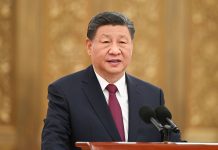Beijing: China has begun to implement its plan to vaccinate priority groups against the novel coronavirus disease (COVID-19) within this late winter-early spring timeframe.
The southern province of Guangdong had vaccinated 180,000 people in priority groups as of December 22, 2020, Duan Yufei, Director of the Health Commission of Guangdong Province, said, adding that so far there had been no adverse events.
Emergency vaccination of priority groups was also kicked off on December 24, 2020 in Wuhan, the city in Hubei Province in Central China that first reported the disease.
“Vaccines will be given first to priority groups, which include those handling imported cold chain products and people working in highly exposed sectors such as port inspection and quarantine, aviation, public transport, fresh markets, medical treatment, and disease control,” Cui Gang, an official with the disease control department of the National Health Commission (NHC), said at a press conference on December 19, 2020.
The vaccination program will also cover those who plan to work or study in countries and regions with a medium or high risk of exposure to the virus, Cui added.
Next up, with more vaccines ready to enter the market and the expansion of production capacity, inoculation of a wider population will be carried out. “This will gradually forge a barrier of immunity among the public to stop the spread of COVID-19 in China,” Cui said.
Race against the virus
Safe and effective vaccines are regarded as the best weapon to win the battle against the pandemic.
After Chinese scientists shared the genetic sequence of the novel coronavirus with the world in January 2020, scientists in many countries joined the race to develop vaccines against the virus. According to the World Health Organization (WHO), as of December 16, 2020, 222 COVID-19 candidate vaccines were being developed worldwide, with 56 of them under clinical trials.
Vaccines against COVID-19 have been rated as the most significant scientific breakthrough in 2020 by U.S.-based Science magazine, one of the world’s top academic journals.
– The Daily Mail-Beijing Review News exchange item





